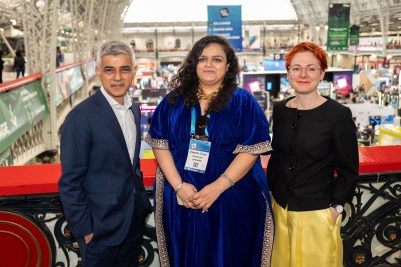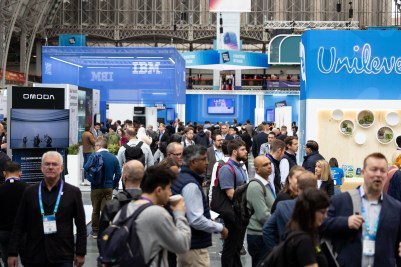London Tech Week 2024: Wayve, NatWest and WPP “seize the AI opportunity”
From self driving cars to banking and advertising use cases, London Tech Week’s keynote openers focussed on AI in enterprise. Ann-Marie Corvin reports
London Tech Week 2024: Wayve, NatWest and WPP “seize the AI opportunity”
“I understand that the organisers of London Tech Week considered showing off the latest in robotic AI generated technology – but apparently Rishi Sunak wasn’t available,” joked the capital’s Mayor Sadiq Khan – attempting to inject a little warm humour into a drafty hall on a wet, gloomy June morning.
Now the UK has entered the election campaign period there was little promise of any major policy announcements on the first day of the tech event’s 11th anniversary, which this year moves to a new venue – Olympia, on the edge of London’s Kensington.
With most of the conference stages swathed around stands and booths, the event is starting to resemble the outline found at most other tech shows, with stands taken by IBM, Unilever as well as hordes of nations promoting start-ups and investment opportunities.
London didn’t need a stand, however, as it had Khan who used his opener to promote the city’s self-appointed status as a tech superhub.
“Our city is one of the largest and most influential tech centres on the planet,” he enthused. “We boast more than 100 unicorns; we are home to more software developers than any other European city.
“The big names from Google to Microsoft are expanding their operations here with investments that are making London a global hub for AI and innovation. “

Khan added that London’s unashamedly “pro-business pro-tech” stance, would inform the capital’s new growth plans, which he said would have “AI and innovation” at their core and would aims to create 150,000 new jobs in London over the next four years.
This year’s TechNation report, UK Tech In the Age of AI – released on the first day of the show – revealed that the city now has 171 tech unicorns (start-ups worth over £1bn) which were all created within the last three years.
Another of the report’s top lines was the fact that the UK is now the number one destination in Europe for AI investment, with the UK AI sector reaching a combined market valuation of $92bn in the first quarter of 2024.
Encouragingly, more scale ups are also now choosing to remain in the country to seek further investment – including Wayve, a self driving, AI powered start up founded in 2017 by New Zealand-born Cambridge graduate Alex Kendall.
The entrepreneur followed Khan onto the stage, to talk about opportunities in the next big thing: embodied AI. His tech firm recently raised $1bn in funding from Japan’s Softbank alongside California chipmaker Nvidia and Microsoft to invest in embodied AI for automated driving in the UK.
Kendall explained that embodied AI would enable automated vehicles to learn from and interact with a real-world environment, including the ability to learn from situations that do not follow strict patterns or rules, such as unexpected actions by drivers or pedestrians.

The entrepreneur added that the UK’s newly approved Autonomous Vehicles Act – which will make it legal to run autonomous vehicles on British roads as soon as 2026 – meant that the tech firm would not be caught up in the broader sweeping AI legislation coming out of the UK and EU, because it’s now governed by these more domain-specific rules.
While the UK Government has claimed victory over the Wayve investment (the biggest yet for a UK-founded AI-start up) and has been supportive legislation wise –Kendall added that there was still more work to be done in terms of nurturing and supporting deep tech companies.
“In terms of scale up capital in the UK there is still an incompressible cycle time. With deep tech in particular – the depth of expertise and the risk taking is just not there. It will come – and can be built on early success stories – but it is not there yet.
The founder added that continued investment in the scale up ecosystem was needed – and not just for fintech and SaaS start-ups – but in more deep tech companies.
“Government policy can influence things with tax and regulatory structures – but it’s about giving the ecosystem time to grow,” he added.
IBM’s UK CEO Nicola Hobson introduced two of its enterprise partners onto the stage, to demonstrate how firms have been “seizing the AI opportunity.”
First up was Wendy Redshaw, chief digital information officer at NatWest Retail Bank, who unveiled the new Gen-AI infused version of their customer service digital assistant, Cora+ which had launched that morning.
The previous version of Cora, introduced in 2017, has already helped the bank’s customers with over 10m online banking queries in 2023 (compared to 5m in 2019).

Cora + incorporates both generative AI – using multiple foundational models from IBM, Meta and Open AI – as well as traditional AI – so that customers can have a more natural conversational engagement with the bank.
Redshaw explained: “For example, previously when a customer asked for a mortgage or a lending product, a link would be provided to a general page and the customer would scroll through and navigate different options. The customer would have to do some of the work.
“Cora+ will be able to understand the context and nuances of each query the customer makes and can provide accurate and personalised responses,” she added.
Media agency WPP’s chief technology officer Stephan Pretorius was next up, predicting that “AI and Gen AI would transform every part of the knowledge work that we do today” from strategy and consulting to law to marketing and ad production.
According to Pretorius, achieving the benefits of AI starts with leadership: “Never before in my career have CEOs been so focussed on one topic across all industries. It requires all our business leaders to have vision of how AI can be acquired and to drive that through the organisation and industry,” he said.
The CTO added that an AI strategy also required a focus on partnership with tech firms like IBM, “to be able to integrate with multiple third-party technologies and data.”
Another key factor was investment, Pretorius added, as he revealed WPP now invests 2% of its net sales revenue in AI investment.

Embracing AI also involved transforming the workforce “at every level,” he added: “The UK has incredible talent pools, but you must transform the people you have as well as bringing in new skills. We’ve sent a large cohort of people to do AI post graduate diplomas and invest in our people.”
WPP’s creative Technology Apprenticeship, he said, was focussed on hiring young people from diverse backgrounds that were “disproportionately female” so that they could develop AI skills in a body of staff that was“ more representative of the word we live in.”
According to Pretorius, WPP has amassed at least 50 Gen AI applications across its advertising business – from helping to generate concepts, creating storyboarding videos with Text-to-Video as well as creating content for products that don’t exist yet, to stimulate early-stage demand.
Subscribe to our Editor's weekly newsletter